
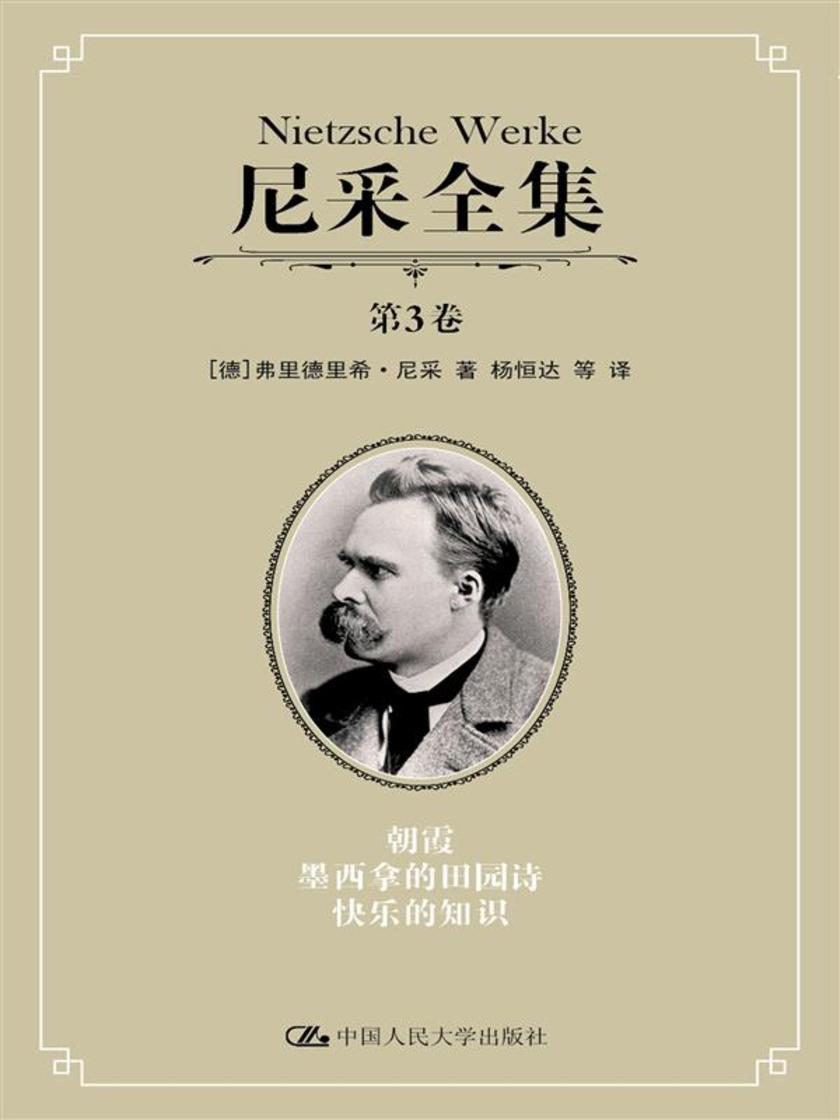
尼采全集 第3卷朝霞墨西哥的田园诗快乐的知识
¥53.88
本卷包括:《曙光》、《墨西拿的田园诗》、《快乐的知识》。《快乐的知识》是尼采后期的重要作品,创作于大病初愈之后。《快乐的知识》浓缩了尼采思想的精髓,对诸如生命、个体与群体能、爱情、文艺、哲学、科学、道德、法律、宗教、社会发展等问题都行了简明而深刻的论述,语言凝练而隽永,思想鲜明而锐利,行文多为警句或短诗,思想火花处处闪现,令人读后有痛快淋漓之感。

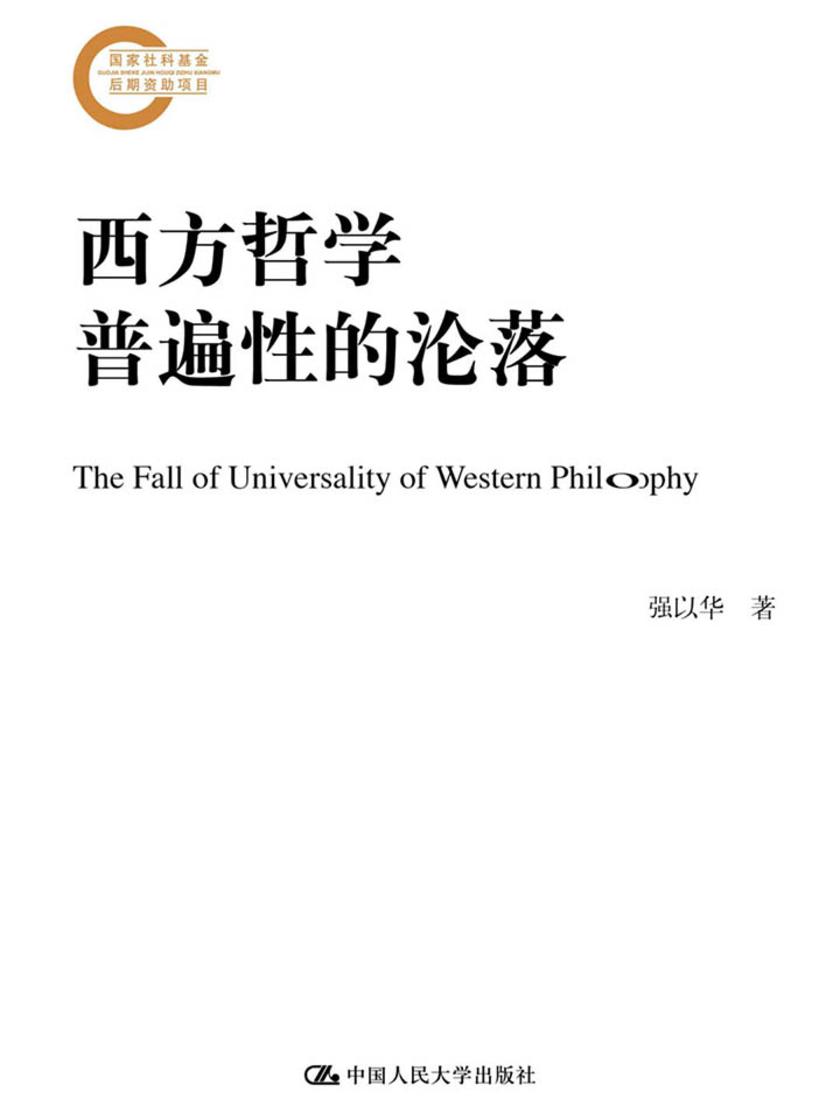
西方哲学普遍性的沦落(国家社科基金后期资助项目)
¥53.88
西方哲学的普遍性是指西方哲学家所阐述的作为世界本质的普遍性。本书认为西方哲学的普遍性作为本体论的对象通过决定人性乃至人的普遍价值观构成了人类之根,因而也决定着人应该如何活着(人是什么、人从哪儿来和人应该到哪儿去)。本书通过传统形而上学、康德形而上学、海德格尔哲学和德里达哲学四个节来探讨西方哲学的寻根之路,认为此一寻根之路从哲学之内看表现为西方哲学普遍性沦落的过程,而从哲学之外看则决定着西方社会价值观从一元走向多元的过程,其中,前一过程构成了后一过程的形而上学根据。西方社会价值观从一元走向多元的历程是一个不可逆的社会步历程,但它也导致了西方社会在精神家园方面之无家可归的消极后果。本书认为,基于形而上学的根据理清这一历程的必然性和内在逻辑是正确评价这一历程并正确探求人类(西方)价值观未来发展方向的基础。


理性思辨:如何在非理性世界里做一个理性思考者(经典珍藏版)
¥53.94
在当下社会,信息爆炸让人们真假难辨,情绪主导的表达充斥着网络,理性思考愈发稀缺。本书完美契合这一社会现状,满足读者对重拾理性的需求。 书中指出,人们对理性存在诸多误解,比如认为理性是完全客观的,能独立引导行为、提供行动动力并构建完美社会。但实际上,理性无法脱离主观判断,在科学研究、政治及经济等各个领域,判断都至关重要。理性无法为行动提供原始动力,也不能设计出完美方案。 理性并非需要一种枯燥、科学主义的世界观,它仅仅是在需要思考之处运用批判性思维。本书旨在帮助人们在非理性的世界中理解理性的本质、局限及运用方式,找回理性,以理性应对各种问题。


佛光菜根谭(精套装)
¥53.99
本书是星云大师从自己几十年的著作和开示记录中,提炼经典汇编而成的一部语录体心灵励志图书。 全书一套三册,集中记述了星云大师对世界、社会、生命等的证悟智慧,以及怎样立德做人、修身养性的智慧,以及如何才能在烦恼生命中寻求到平静而开阔的心灵境界的智慧。言简意赅,精妙处往往让人醍醐灌顶。若能每日一偈,则日日都有新智慧,日日都能有好心情。


极简阳明心学:你当善良且有力量
¥53.99
阳明心学用一句话说完:善良出能力!通俗讲就是,让善良的人有力量。说起来简单,但是做起来却没有那么容易。很多人学了几年的心学还是不太明白,这是因为在心学整个体系里王阳明本身就是那个密码。因此要想讲透阳明心学,一定要讲到王阳明的生活、思维、行为方式,这样才能把王阳明讲“活”了。 本书分为上、中、下三卷:上卷,按照时间顺序,从王阳明的出生讲起,到王阳明去世为止,包含王阳明的人生经历,其思想体系如何从萌发到成熟;中卷,深浅出讲解阳明心学体系构成的“元素型结构”(“良知”“心即理”“致良知”“诚意”“格物”“致知”等),阳明心学的“奥秘以及如何学习阳明心学等:下卷,讲王阳明如何善心不愚,跟随自己的直觉,践行自己的思想--知行合一,勇于改道超车,最终走出了自己“致良知”的人生道路。 人不违背自己的良知(良心),才能常快乐。阳明心学是让人遵循内心的良知,知行合一,善良出能力,用自我的力量来生成自我,让生命去照亮生活,而不是用生活剥夺生命,是让人们“天天向上”,每天都能活出生命的新感觉,心安理得地活出当下的智慧。
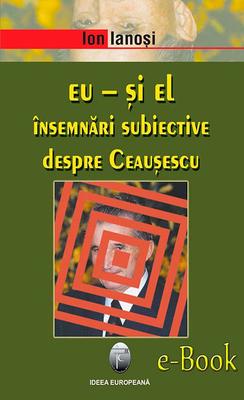
Eu - ?i el. ?nsemn?ri subiective despre Ceau?escu
¥54.10
De?i frecvent contestat f?r? s? fie citit, Karl Marx r?m?ne a fi unul dintre cei mai importan?i g?nditori ai omenirii, r?u ?n?eles ?i, ?n ciuda celebrit??ii sale, r?u cunoscut; selec?ia – prima de dup? 1990 – f?cut? de marele c?rturar Ion Iano?i demonstreaz? r?spicat acest lucru.


文化的江山08:近代化与中国大航海
促销价:¥24.99|¥78.00
本书讲述我国自先秦到明朝不同历史时期的沿海文化、航海活动以及海权思想的演。 在古代中国里,以耕战和耕读为代表的江河农耕文化占据了主导地位,以军马同体及牧战合一为代表的草原游牧文化与之互动交替,而沿海文化则处于边缘,未传统史学的主流。作者摆脱了传统史观,从陆地出发,放眼海洋,跳出旧观念的束缚,从农耕文化转向海洋文化。 本书梳理了2000余年18000千米海岸线上的历史变迁,描绘了史诗般波澜壮阔的航海活动,呈现出生机勃勃的航海景象。自先秦以来,中国的航海活动大致分为东、南两路,以东夷、百越为海洋文化的主体。从秦皇到汉武,赵佗在汉武通西域之前,率先从海路通了西域。海路通西域,重在贸易,不以战争为目的。而汉武帝为古代中国出海辟了一个大航海时代。三国两晋南北朝,卫温、诸葛直的航海远征为中国留下了第YI部航海史料。到了唐代,杜环成为大唐航海第yi人,他的《经行记》记下了地中海沿岸的诸多城市。宋代王安石从海洋看到了国家财富的增长,看到了比大运河还广阔的市场。而元代的汪大渊则被人称为“东方的马可·波罗”。到了明清时代,郑和下西洋辟了中国海权时代。随着欧洲人西来,西学东渐,沿海一带海洋文化主,造就了新的中国文化。 作者胸怀世界格局,深挖史料,结合考古成果,对比了东西方两个截然不同的大航海时代,探究“海权”思想对统一不同经济体、整合跨海域的超级经济世界,以及国家现代化转型的推动作用,展现出中国与世界互动的大航海景象。 ------------- 《文化的江山》系列共3辑12册,中信出版集团·见识城邦出品: 辑:文化中国的起源 文化的江山01:文化中国的来源 文化的江山02:王朝中国的确立 文化的江山03:中国风雅颂 文化的江山04:中国轴心期 第二辑:走出王朝的中国史 文化的江山05:走向世界历史的国度 文化的江山06:通往文艺复兴的岁月 文化的江山07:追求思想共和的时代 文化的江山08:近代化与中国大航海 第三辑:告别晚清的近代史 文化的江山09:世界近代史的中国影响 文化的江山10:被西洋与东洋夹的天下 文化的江山11:告别晚清的中国近代史 文化的江山12:文化中国里的新文化运动

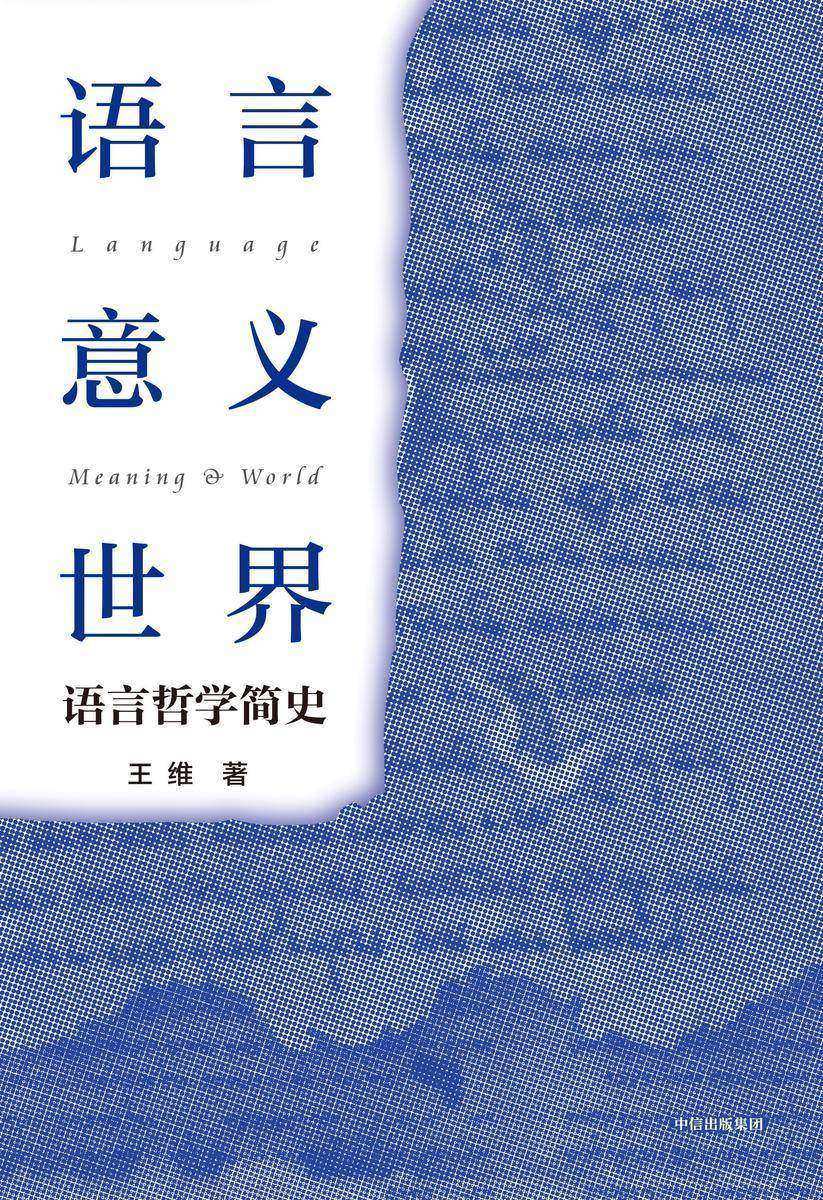
语言·意义·世界:语言哲学简史
¥54.60
本书是一部介绍20世纪英美语言哲学史的普及读物。 所谓语言哲学,顾名思义,就是关于语言的哲学。它关切语言的意义、指称、用法,以及语言与思维之间的关系等命题,但它的最终目的是通过对语言的探究来理解世界。 20世纪初,西方哲学经历了所谓“语言转向”,人们不再仅仅把语言当作哲学思考的工具,而是把它视为一种哲学研究的对象。由此,语言哲学成为20世纪西方哲学的核心议题。 英美语言哲学的发展历程大致分为以下五个阶段:一、以弗雷格、罗素、早期维特根斯坦为代表的语言哲学的形成;二、以维也纳学派为代表的逻辑实证主义思潮的兴起;三、以后期维特根斯坦、牛津学派为代表的日常语言哲学的转向;四、以蒯因为代表的逻辑实证主义与美国实用主义的融合;五、以克里普克、塞尔等为代表的语言哲学在当代的新发展。本书各章节即循此展。


技术哲学导论
¥54.60
技术哲学是哲学中一个年轻的分支,它是对技术的哲学思考,着重研究技术的本质、技术发展的一般规律和价值,以及技术与社会的关系等。如今,技术已经深普罗大众的生活,成为人类社会不可或缺的日常。如何处理技术与人类的关系,是现代人必须面对的问题。 本书探讨了技术的种种定义,讨论了科学哲学与技术哲学的关系,并着重介绍了技术哲学中主要的研究课题,包括对技术理性的讨论,技术对社会和文化的影响,技术专家治国论,技术决定论和技术自主论,现象学和解释学在技术哲学中的应用,女性、非西方人和原住民等常被忽略的群体的技术贡献,反技术思潮,以及技术的社会建构理论等。 本书为读者提供了关于技术哲学的整体而全面的知识,为批判性地研究技术的性质及其对我们的影响提供了必要的工具。 作者专业知识之广博令人印象深刻,他对技术哲学议题的充分构思也很及时。在这个还没有主流观的领域里,很少有人能理解这种广泛讨论的重要性,更少有人具备足够的知识和独到的见解,可以在所有这些领域发言。瓦尔·杜谢克这样做,并且做到了。他的书正是现在所需要的。 ——Robert C. Scharff,新罕布什尔大学

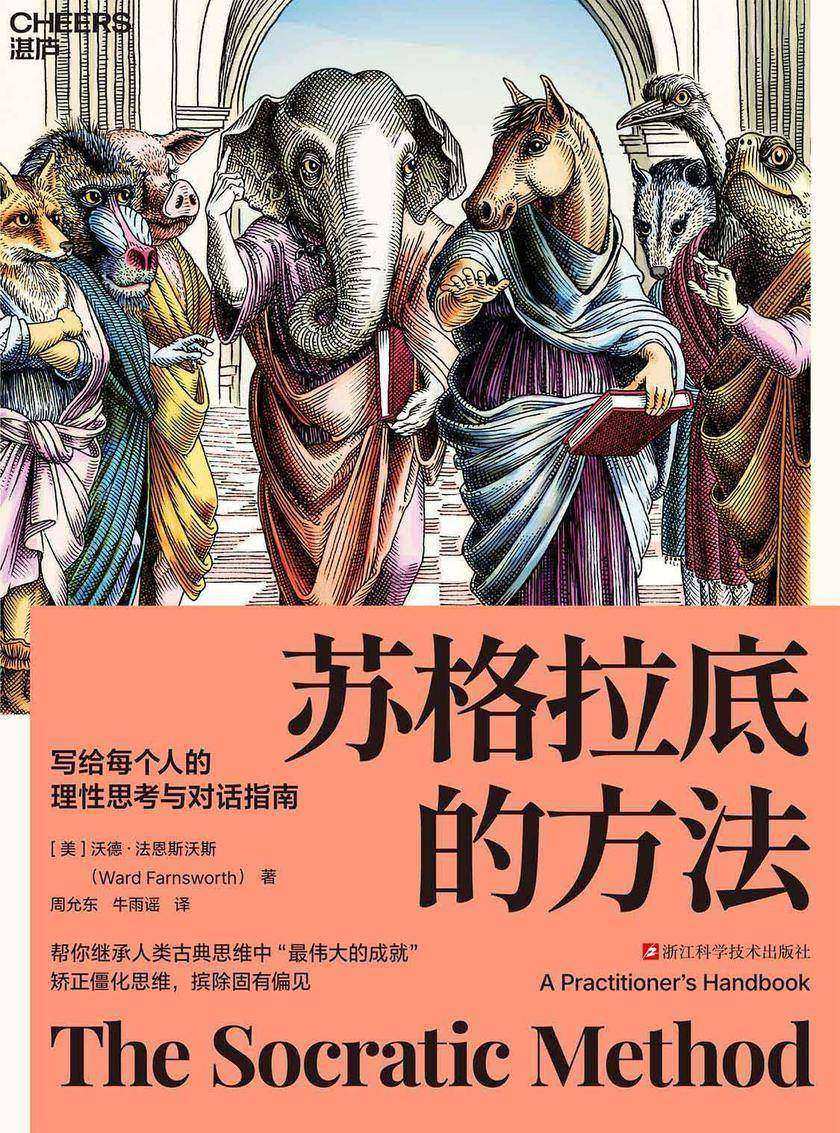
苏格拉底的方法
¥54.95
为什么我们总是自信满满,却难以察觉自己的无知? 为什么我们在争论中总是急于取胜,而不是寻找真理? 为什么我们宁愿固守偏见,也不愿直面思想的矛盾? 为什么我们害怕被质疑,却又渴望真/正的智慧? 为什么我们总是觉得自己已经想清楚了一切? 所有这些问题都与你的思维方式有关,实际上,你并没有想象中那么善于思考。 大约2500年前,柏拉图描绘了苏格拉底的对话,苏格拉底提出问题的方式及其原因,构成了一种完整的思维方式,这就是苏格拉底的方法,该方法不仅仅是一种技术,更是一种耐心、探究、谦逊和怀疑的行为准则,启了人类对智慧的追寻。在苏格拉底方法的帮助下,你会发现,所谓的确定信念或许不过只是由未经审视的假设堆叠而成,那些看似理所当然的观,背后也隐藏着未曾察觉的矛盾。这是一本写给所有人的理性思考与对话指南,帮助人们在日常活动中理解生活,如何生活,以及如何更好地生活,指引一条充满挑战的智慧探寻之路。 一本书助你提升思维能力,学会理性思考。作者以哲学的深度,循序渐,从基本要、逻辑规则到自我检验,引用超过百则《对话录》中的精彩辩论,向读者介绍了「人类史上蕞伟大成就之一」苏格拉底的问答技巧与思辨策略。


我反抗,故我们存在
¥54.99
《我反抗,故我们存在》是诺贝尔文学奖得主加缪历时十年构思的代表作,是加缪自己蕞为钟爱的作品之一。自出版以来,影响了数代青年人,成为理解我们时代与人的政治学经典。 自《西西弗神话》后,加缪重新审视生命的意义,从“荒谬”中推导出“反抗”,认为人是唯一懂得说“不”的生物,正是在对一切荒诞、不合理的拒绝中,人才找到了活下去的理由。 加谬重新审视了人类历史的反抗者及其思想,如萨德、波德莱尔、圣如斯特、卢梭、尼采、陀思妥耶夫斯基、黑格尔、巴枯宁等;回顾了法国大革命和俄国革命,探讨了反抗是如何走向革命的,并由此造成了怎样的灾难性后果。最终,他指向所有人的内心:什么是自我存在的意义,自我的价值与尊严? 本书是加缪对世界的反抗宣言,也是他对所有既成答案的挑战。

打开:周濂的100堂西方哲学课
¥54.99
苏格拉底为什么拒绝众人的苦苦哀求,拒绝越狱,勇于赴死? 《理想国》为什么是一部伟大的“失败之书”? 康德又是如何实现了既为人类的理性划界,也为上帝和信仰留下地盘? 为什么论起抽象和晦涩简直可以说举世无双、独孤求败的黑格尔,却批评我们普通人经常陷“抽象地思维”? 兼有病态的人生和健康的哲学的尼采,为什么说弱者、怨恨之人的灵魂是“歪”的? 自由雅典与铁血斯巴达共同之处在于——对“卓越”的不懈追求;提出“我思故我在”这个伟大命题的笛卡尔,居然是个赖床的哲学家;日常生活中“人畜无害”的胖子大卫·休谟,在哲学领域却是一个勇猛精的斗士;莱辛说人们谈论斯宾诺莎就像谈论“一条死狗”,马克思也说哲学的老王黑格尔死后被当成“一条死狗”,可是如今他们却都死而不僵、借尸还魂了…… 我们还会发现原来《黑客帝国》的思想火花早在笛卡尔的《*哲学沉思集》中就已出现,著名的“钵中之脑”与《盗梦空间》有着类似的结构,而刘慈欣在《三体》中描绘的黑暗森林法则,霍布斯早在几百年前就已经讨论过了。 哲学,是全部智慧的综合。纵观西方哲学2500年的风景,从古希腊到中世纪,以至文艺复兴、启蒙运动和当代,从泰勒斯、苏格拉底、柏拉图、到托马斯·阿奎那、卢梭、康德、尼采、维特根斯坦、罗尔斯……哲人们的思想影响、改变了整个人类文明史,而具体到我们每一个个体来说,哲学有着不可言说的慰藉与乐趣。 如何理解与学习西方哲学?如何从懵懂的好奇真正踏哲学思考的国度?著名学者周濂集多年哲学授课与研究的经验,用通俗的语言介绍深刻的思想,借助于日常有趣的小例子抽象的理论,在鲜活的生活事例和抽象的概念之间建立联系,带领我们一步步地拾级而上,探索每一处哲学景观的历史背景和妙处,解析各种哲学理论的关键所在和细微之处,讲述柏拉图的《理想国》、康德的《纯粹理性批判》、维特根斯坦的《哲学研究》到底都说了些什么。 这就是本书为你呈现的——100篇有趣、有料,不高冷、不轻佻的精彩哲学普及文章,一部有态度、有营养,读得懂、读得动的西方哲学史,一本越读越精神的哲学门书。


国学的天空
¥54.99
“国学”是个宽泛的名词,其中儒家与道家是重。儒家的代表是孔子与孟子,道家是老子与庄子。 四位圣哲思想博大宏深,原典本义难以把握,傅佩荣教授凝聚数十年研究心得,融汇中西哲学,深浅出解读《论语》《孟子》《老子》《庄子》四部经典。 本书分为四部二十二章上百小节,对四部经典行原文解读。傅教授结合现实生活,分别从学习、自我修养、立身、阅世、识人、交友、管理、审美、处世等等方面引申阐发,包含了四位圣哲思想中所有重要的部分。 傅教授说,人活在这个世界上,不能没有儒家作为指引,每一个人都是从家庭出发,然后社会,因而必须设法实践人与人之间适当的关系。从整体来看,到更高的层次来看,跟“道”结合,做到屈伸自如,退有度,“外化而内不化”,就会摆脱世上的许多烦恼和束缚,活得更为自在、潇洒和愉快。


我们如何思考
¥54.99
在这本书中,作者向我们介绍了自哲学诞生以来困扰许多思想家(如笛卡尔、休谟、康德和维特根斯坦等人)的哲学问题,这些问题包括:自我、心灵、自由意志、上帝、命运、善良和正义等。通过简练的叙述、逻辑严密的论证,西蒙向读者揭示了思想家们在这些问题上的思考历程,并提出了他自己的思考和看法。 本书自1999年在英国首次出版后,畅销多年。它不仅向读者展现了哲学知识和思考方法,也向读者描绘了哲学的本质及其魅力。


柏拉图主义的助产士:柏拉图《泰阿泰德》中的显白之辞与言下之意
¥55.00
《柏拉图主义的助产士》通过精细微的逐字解读和高屋建瓴的整体把握,得出一个耐人寻味的结论:在柏拉图早期对话《泰阿泰德》中,作为主要发言人的苏格拉底虽然还不是一个柏拉图主义者,但已是柏拉图主义的“助产士”。事实上,柏拉图一生不断回头去评估他所继承的苏格拉底遗产,揭示它如何铺设了自己的形而上学之路。此书不仅仅是要对一部哲学杰作提出新的解释,更是要还原出一件事:柏拉图对他自己早期作品中的苏格拉底形象作何评论?


图像几表
¥55.00
本书是关于方以智《图像几表》的校注。《图象几表》是方以智编著的《周易时论合编》的部分。方以智承袭朱熹《周易本义》以来的象数易学注《易》著作的一般体例,将易图及其说明文字作为部分,将《周易》文本的批注作为第二部分。《图象几表》正是其部分,即易图及易图的说明文字。 《图像几表》共分八卷”,是以采录《周易古今文全书》“易学启蒙”五卷之图为主,旁及诸家易说或易图,分“图书”、“卦画”、“八卦”、“卦变”、“蓍策”、“卦序”、“旁徵”七部分,集图二百余幅。 方以智的《图象几表》,从所集易图之多及阐述之深刻来看,是对汉唐宋元以来易图书学的一次总结,亦是阐述方氏象数易学必不可少的一部分。是明末忧患之际产生的易图学三大奇书之一。《图象几表》将当时的哲学知识与象数易学相结合,企图从易学中寻求万法之根本,以“贵为时用”为宗旨,亦大有力挽狂澜之意。《图象几表》对后来清代易图学的发展影响颇大,是一部历代象数易学的总结之书。 《周易时论合编》于顺治十七年(1660年)由白华堂刊刻,迄今发现的三个藏本皆由该刻本印出:一为日本内阁文库藏本,1983年台湾文镜文化事业公司將之影印出版;一为北京大学藏本,2002年影印出版于上海古籍出版社的《续修四库全书》丛书经部易类第15冊;一为中国社科院哲学所藏本,原书有残,据日本内阁文库藏本补全。这三个藏本皆由顺治刻本印出。因各藏本图文皆存在印刷模糊不明处,故《图像几表》的校注以文镜公司影印本和《续修四库全书》影印本互参校正。对于二本皆误刻、漏刻或模糊不清的內容,主要采用其他相同或相近文本、行文理路和义理、计算方法等行校正。在此基础上,又对人名、地名、书名,及重要的概念、术语、命题等略加注释,以方便读者阅读、研究。


美是如何诞生的
¥55.00
在人们的常识中,感性与理性、艺术与哲学的对立已经根深蒂固了。西方哲学家们的一些说法也加强了这种对立。维柯断言:感受强则理智弱,理智强则感受弱,两者是不可能共生共长的。尼采曾提出一个反方向的问题:哲学家苏格拉底还能搞艺术吗?尼采的答案是否定的。但恰恰从尼采始,时代精神风貌大变,艺术与哲学的边界始模糊了;第二次世界大战以后更有了当代艺术,艺术与哲学的关系被重构了。 本书以艺术与哲学的关系为主线,大尺度地梳理艺术哲学的历史,力图呈现艺术哲学史从古典、近代到现当代三个阶段的总体特征。我们要问:美是如何发生的?这既是一个艺术史的问题,更是一个哲学史的课题。 相应的超星线上选修课《艺术哲学:美是如何诞生的?》自2019年上线后广受欢迎,不到三年时间已有近14万人次选课。


我的教育观(丘成桐作品)
¥55.30
数学家、教育家丘成桐谈教育 直中国教育痛 不容错过的丘成桐学习法 走丘成桐的内心世界,看一位数学家的志气与操守 本书是国际数学大师丘成桐的作品,通过自己的成长经历和人生感悟,真诚给出面向未来的教育解决方案。 他从自己的家学渊源讲起,回顾了自己人生中的重要时刻。年幼时候条件艰苦,仍坚持追求学问;遇到数学难题寂寞坚持,终于攻克难关,登上数学高峰;从哈佛退休后落叶归根,为中国基础科学教育培养领军人才。 在书中,他分享了追求学问时感受到的单纯的乐趣,体现了科学家对真理执著追求的精神。分享了自己的学习方法,特别是学习数学的方法。针对从幼年时期的家庭教育,到中学、大学、研究生阶段的学校教育,都给出了真知灼见。 对广大学生、家长、教育工作者都有重要的指导意义。


逻辑与哲学
¥55.30
本书通过对亚里士多德的《形而上学》、康德的《 纯粹理性批判》、黑格尔的《逻辑学》、弗雷格的语言哲学、维特根斯坦的《逻辑哲学论》、达米特和戴维森等的意义理论、柏拉图的思考等行探讨,揭示了逻辑对语言的分析和哲学之间的关系。


时间的战争:五百年钟表博弈史
¥55.30
钟表的历史,既是一部技术史、商业史,又是一部文化史、生活史,更是一部战争史。 近代以来,制表业就是战争的宠儿。表因战争而兴,又服务于战争。大到一个国家的转向、一个产业的兴起与毁灭,小到一个品牌的诞生、一个品类的流行,往往都与战争有着密切的联系:瑞士为什么会成为“钟表之国”?号称“表王”的百达翡丽是如何创立的?为什么古代曾是女性专属的腕表,如今却总戴在男人的手腕上?为什么飞机、玩潜水都得有专门的腕表?…… 任何历史,又都是关于人的历史。在大屠杀中逃往瑞士日内瓦的钟表匠,终究成就了这座钟表城;在轰轰烈烈的法国大革命中差命丧断头台的“国王的制表师”,始终在思考如何对抗地心引力;一个国破家亡流落异乡,卖表只为求一口饭的波兰士兵,后创立了“表王”;一个花了100年蜕变为制表之都却在轰炸中灰飞烟灭的荒凉的采矿小镇,在45年后实现浴火重生…… 在真实的战争之外,制表业内部的博弈也从未停止。不同品牌、不同国家的制表师各显其才。当人们不想再依赖高高的钟楼,于是便有了更小的摆钟;当水手不想在大海中迷航,于是便有了航海钟;当飞行员腾不出手掏出怀表,那就想办法把表戴在手上;当潜水员差死于氧气耗尽,那就做一块可以计时的潜水表…… 商业竞争甚至也会演变成“没有硝烟的战争”。瑞士表的天文台认证背后,蕴藏的是一场工业化带来的危机;石英表要“革”机械表的“命”,机械表的自卫和反攻又是如何做得漂亮?…… 生产方式的革新、科技与传统的博弈、各大品牌与制表集团在商场的纵横捭阖,共同写就了一部“时间的战争”。


中国古代身体思想研究
¥55.30
本书以马克思主义身体观为指导,合理地吸收运用西方身体理论,在传统经典研究的基础上,参考有关的研究著作、论文,对中国古代身体思想作出逻辑梳理、科学分析和辨证批判。本书分三大部分。序言部分主要以习近平总书记关于传统文化的重要讲话和2017年1月中共中央办公厅、国务院办公厅联合印发的《关于实施中华优秀文化传承发展工程的意见》为切,论述选题的缘起和意义。指出在西方政治哲学身体转向的同时,中国从20世纪90年代起也始传统文化的身体关注……中国古代身体发展史是一部从奴隶社会到封建社会的身体铭刻史。与西方身体思想发展经过自然身体思想观、神学身体思想观、社会身体思想观三个时期一样,中国身体思想发展也经过三个时期,即:先秦身体图式时期、两汉魏晋南北朝身体叙事时期和唐宋元明清身体社会化时期。它分别对应中国奴隶社会瓦解封建社会形成时期、封建社会一步发展时期和封建社会繁荣衰落时期。它详细地展示了身体的多重面相和权力、话语在身体下的烙印。




 购物车
购物车 个人中心
个人中心



